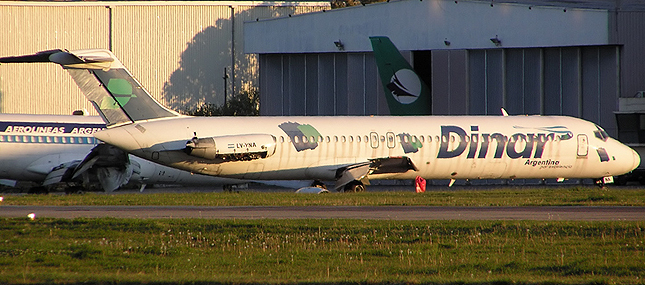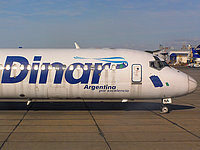|
“Nothing else”. Perhaps this phrase
summarizes the present of third major airline of the nineties in
Argentina. Far from to try to teel here of the history of Dinar Air
lines, before facing completely this particular, will be intersting to
make brief racconto of the birth, development and aim of one of the many
privated commercial companies that flown in Argentina and, in 2002 it
finalized his operations because of bankruptcy.
We must come back to year 1992, when DINAR
(a tourism agency from Salta province) decided to go further on in the
market and to ask for authorizations to fly exclusive charters in the
route Salta-Tucuman-Iquique (Chile). With happening of the time and the
the market growing, the company began to provide the wished success;
adding to the original route more destinies. This allowed great part of
the population of the interior of the Argentina, that never before had
traveled in airplane to vacacionar, to be able now to do it and, which
is more important, without having to fulfill the forced and debilitating
passage by the City of Buenos Aires. This panorama allowed Dinar to face
a more ambitious project and to finalize with the expensive rentings of
airships to fulfill its flights, and to mount like an air line proper to
put to give fight in a aerocomercial market extremely difficult to
compete like the Argentinean.
It was in 1993 when Dinar Air lines was born and obtained the first
permissions for non regular flights for passengers, mail and load. Later
in 1994, the airline began with the regular operations. A period of
great success began for the company, who showed differentiated quality
characteristics from the other companies. A lot of details, not less
important at the time of choosing an airline, beyond the value of the
passage. For example a catering service with exclusive menu “a la carte”
supervised by the famous Argentineas international level chef “Gato”
Dumas. Also an outstanding punctuality, near 90%, and a special interest
in demonstrating the security of its own operations were Dinar´s work
horses.
Dinar was characterized by the use of different aircrafts types from of
the main world manufacturers. The company flew charters and regular
flights with airplanes such as Airbus A300 and A310, Boeing 727, 737,
757 and 767, Fokker F-28, Douglas DC-9 and McDonnell Douglas MD-80.
In 2002, Dinar was deeply affected by the economic crisis in Argentina.
The company´s managers could not solve the growing financial problems
and the market in recession with very low aircraft occupancy sealed the
company fate. At last Dinar cancelled all flights and finally a request
of bankruptcy close the company.
Glory and decline of Yankee
November Alfa
During the golden years Dinar decided to
leave to the purchase some airplanes and balance inclined in favor of
the manufacturer of the American west coast: McDonnell Douglas. It was
when these airliners began to arrive to Argentina. The first were DC-9
and then Super DC-9 (MD-80 Series). In April of 1998 arrived to the
country the main protagonist of our history, McDonnell Douglas DC-9-41
with temporally serial LV-PNP. This plane was previously flying with
French company TAT (Transport Aérien Transrégional), with Finnish serial
OH-LNF.
Once complimented all the proceedings of definitive matriculation in the
national registry of aircrafts, she obtained her Argentine registration:
LV-YNA.
|
Aircraft data |
|
Model |
Douglas DC-9-41 |
|
Power plant |
Pratt & Wittney
JT8D-17A x 2 |
|
Serial
number |
47614 |
|
Order
number |
747 |
|
Seats |
138 economy |
|
Manufacture date |
October 17, 1974 |
|
Total hours |
49.455 |
|
Total cycles |
62.102 |
|
The history of this
aircraft began in 1974, when the Douglas received a purchase order from
the Japanese company TDA (Toa Domestic Airlines) by a total of 25
airliners. This particular aircraft occupied position 747 of the line of
production, received the serial number (MSN or manufacturer serial to
number) 47.614, and Japanese serial JA8430. Later, in 1983, she was sold
to the famous nordic operator of Douglas airplanes, Finnair,
having received Finnish matriculation OH-LNF, until his inscription
under Argentine flag.
The airliner was destined to cover local and regional routes, operating
regular and non regular flights. Throughout her service life in Dinar,
she dressed two colours schemes. At the beginning, the aircraft was
painted in white with blue and green of Crossair style: her vertical fin
blue with the green Dinar logo and the great streamlined capital letters
on both sides of the fuselage: “Dinar Lineas Aéreas”.
Later, it maintained a
very similar scheme but the big letters that mentioned the company name
were changed. Only was maintained the capital letter with company’s name,
a small Argentine cheat lines were added togheter the phrase “Argentina
por Ecelencia” (“Argentiner for Excelence”), in a clear message of
differentiation with the Argentine airlines group of Spanish capitals.
This practice was not only used by Dinar, which also coloured its
airplanes with the phrase “From the North of Argentine to the Mercosur”,
but also by LAPA. This contemporary air line of Dinar was pioneering in
this marketing strategy decorating his airplanes with a great Argentine
insignia that claimed “Ser argentinos nos acerca” (“To be Argentinean
approaches to us”).
After offering service
during years, Dinar finalized its operations and consequently, the
airplanes of their fleet that were hired returned to their owners. Those
property of the company were, with the opening of bankruptcy, were
scattered in different aerodromes all around the country.
For example, the case of the DC-9-34 registered as N927L (MSN 48123),
still could be seen in Tucson, Arizona, dressing Dinar colours in 2006.
By the other side, the airplanes that remained in Argentina, like the
registered LV-YPA and LV-YOA, were preserved in the aerodrome El Palomar
without their motors. The aircraft registered LV-YNA remained preserved
at parking position 41 of the industrial platform of Metropolitan
Airport Jorge Newbery years after the disappearance of the company.
Parked together for private and corporate aircrafts, the LV-YNA was
waiting for years in the hope of better luck.
|
Yankee November Alfa last hours...
(photos Carlos Lefans) |
|
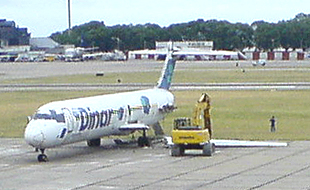 |
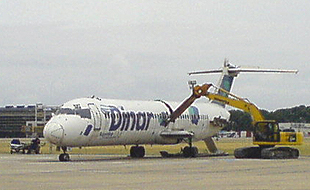 |
|
Wings cut off. |
First incisions in the fuselage. |
|
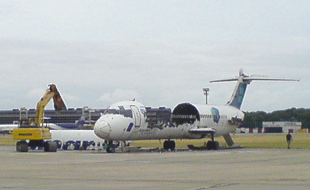 |
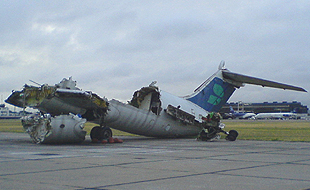 |
|
Clearing the upper fuselage section. |
Tail section scraped. |
|
As the legal process
advanced, the bankruptcy of the company was imminent and clear. The
uncertain end of its airplanes, too. When the bankruptcy took place and
the company’s inventory was auctioned, there only was one way to sell
the plane: to cut her in pieces and to commercialize like scrap.
The alternative, transfer the airplane to an aeronautical museum, hardly
could be considered because of associated costs of transferring the
aircraft to its new home, a difficult operation, still if the owners of
the airplane, had decided to donate her.
The destiny played a macabre joke in the Day of the Innocents, December
28, 2007, when an enormous yellow machine began to cut the fuselage of
the LV-YNA and load her parts on a great truck that left the airport
with an unknown destination. The end of a golden decade of great
Argentine airlines
Buenos Aires, August de
2009
|
